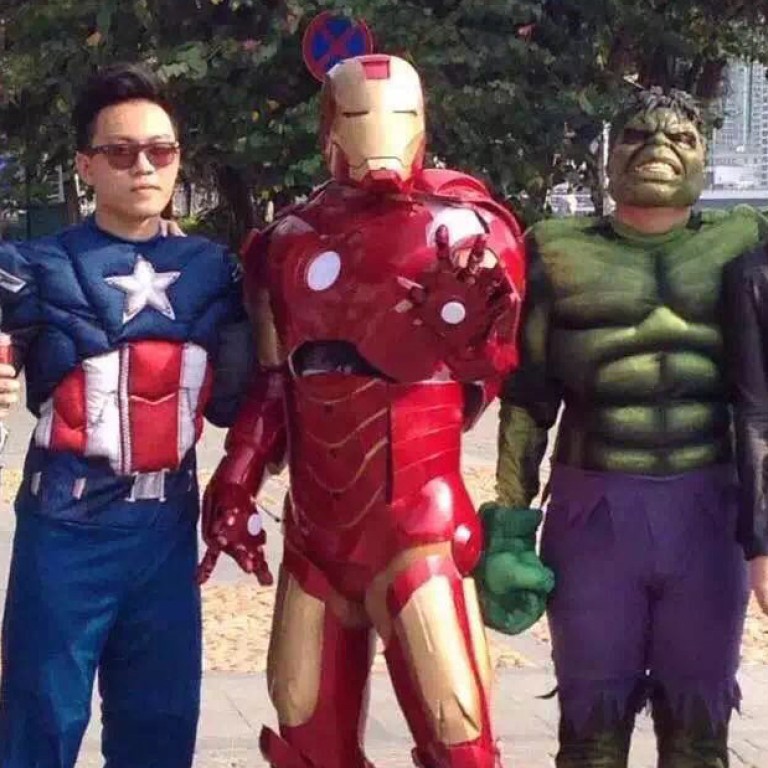
'Got a ride from Black Widow?' Uber turns to the Avengers in wake of crackdown
The company described the drivers as heroes rescuing people trapped by a lack of affordable taxis. “Have you got a free ride from Black Widow?” soon became the hottest topic that week on social media among young people in Guangzhou.
“I, as well as my friends and friends of their friends, tracked the drivers and shared pictures through online and mobile. It’s just fashionable and fun.” said Tang Ying, a 29-year-old Guangzhou-based clerk.
Tang said her three cousins and their parents have all downloaded Uber apps on their smartphones in the past week.
“Our family now is big fan of Uber. And we all hope official raids could continue, that could lead to more and bigger promotions.” Tang said.
The authorities said the raids were part of a broader official crackdown on web-connected private car companies, whose services are considered illegal because they do not have taxi licences. Official concern has also grown that protests by taxi drivers against such services could lead to social unrest.
Uber has kept a low profile over the actions, saying only that it will cooperate with the relevant authorities. Meanwhile however its popularity is surging as launches its special campaigns.
Among its promotions in Guangzhou are 50 per cent one-time discounts, or an offer of 20 rides at 30 per cent off each or 20 per cent discounts for multiple rides, making journeys between a half and two-thirds cheaper than by taxi.
Getting hold of the codes for these promotions through social networking platforms has become a must-do activity among white-collar residents each day.
Drivers have also benefitted too. Each ride in rush hour or after midnight in Guangzhou entitles drivers to a 50 yuan subsidy. And they can earn 300 yuan extra if they have 30 rides during a week, 400 yuan for 40 rides, 800 yuan for 70 rides and 1,200 yuan for 90 rides.
In Chengdu meanwhile, Uber has begun offering 50-yuan coupons for new clients and 12 per cent discounts for regular users after the May 6 raid by city transport officials.
“If you had taken Uber three times or more during last weekend (May 16 and 17), you would get three to five free rides this week,” said Xiao Yi, a local resident.
She said Uber is much cheaper than Chengdu taxis, which usually ask for high prices for long-distance rides.
“It costs at least 80 yuan to the airport from my office by taxi, but only 25 yuan through Uber,” she said.
Dozens of drivers rushed to support Uber when the Chengdu office was raided, gathering outside and briefly surrounding officials until dispersed by police.
“As far as I know, there are at least four or five Wechat groups of Uber drivers in Chengdu, each with up to 200 people,” said one driver in the city, who declined to give his name.
He said the drivers had become good friends and have started a fund to help any of their number who might be fined by authorities in future for being an Uber driver, with each putting in 100 or 200 yuan.
The surging popularity of Uber has also drawn business people seeking to link their companies to the service, which functions as much like a social networking app as it does a solution to practical transport problems.
Wang Hong, a 30-year-old woman in Chengdu, became an Uber driver in February out of curiosity.
She also runs an e-commerce company in the city called Weilu that sells local Sichuan cuisine and spicy snacks, and soon found Uber was a useful platform to promote her business.
“I found almost everyone I know is proud of being an Uber driver or passenger. I think Uber’s clients are actually my market, young middle-class Chinese who use apps and the internet every day,” Wang said.
She persuaded Uber’s Chengdu office to run a promotion giving away a local delicacy from her company, spicy abalone, to passengers between May 4 and 6.
Media attention on her work with Uber has raised the profile of her company in the city.
“Working with Uber equates my brand with innovation and the new lifestyle among young Chinese,” Wang said.




